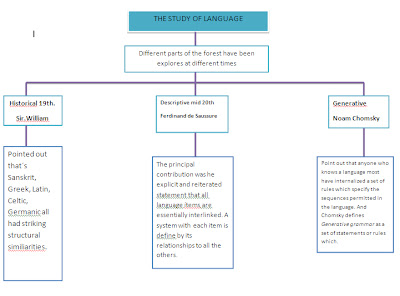
Sassure: Language as a social fact
Mongin- Ferdinand de Saussure
|
Emile Durkheim
|
Gabriel Tarde
|
Noam Chomsky
|
Hilary Putnam
| ||||||
Who defined thenotion of ‘synchronic linguistics’ the study of languages as systems existing at a given point in time, as opposed to the historical linguistics wich had seemed to his contemporaries the only possible approach to the subject.
Two of his colleagues
Historical linguistics is a relatively simple, even beguiling affair of describing one isolated event after another.
Synchronic description is a more serious and difficult ocupation, since here there can be not questions of presenting insolated anecdotes.
A language comprosed a set of “signs” each sign being the union of a signifian with a signs cannot be considered in insolation, since but theire pronunciation and there meaning are defined by their contrast with the other signs of the system.
Saussure`s assignment of syntax to parole rather than to langue is linked in another with the question of linguistic structure as social rather than psychological fact. Argued that langue must be a social fact on the grounds that no individual knows his mother-tongue completely.
|
Is the founder of sociology as a recognized empirical dicipline: to understand what Saussure means by calling lenguages “social facts”.
Propunded the notion of “social facts” in the Rules of Sociological Method, the task of sociology was to study and describe reaim of phonema quite distinct in kind both from the phonema of the physical world and from the phonema dealt with by phycology.
Social Facts are ideas in the “collective mind” of a society.
The collective nind of a sociedty is something that exist over and above the individual members of society, and it`s ideas are only indirectly and imperfectly reflected in the mind of people who make up that society.
The legal system of a society is a relatively salient example of a highly structured social facts which has effects, often very tangible ones, on the lives of all the members of the society.
The concrete data of parole are produced by individual speakers, but language is not complete in any speaker; it exist perfectly only within a collectivity.
Durkheim made some remarkable sociological discoveries, notably in his work on Suicide.
|
Tarde stressed that sociological generalization how only because individual human beings have a propensitive to imitate one another.
The dialigue between Durkheim and Tarde was carried on in the journals over a number of years, with consederable passion on both sides: it culminate in a public debate between the two men at the Ècole Practique des Hautes Ètudes in Paris in December 1903.
|
Chomsky himself actually identifies his notion of linguistic competences with Saussure language.
Chomsky`s “competence”, as the name suggested, is an attribute of the individua, a phychological matter, he often defines competence as “the speaker-heare`s knowledge of his language.
Chomsky is American a that linguistic self-comfidence seems less common in American than in British society, perhaps because of the large proportion of Americans whose command of English is only a couple of generations old, both style the USA has not given itself the language-canonizing institution on France.
|
The philosopher Hilary Putnam has recently developed an argument which seems to show that the issue is more than a question of taste and that least one important aspect of language, namely semantic structure, most be regarded as a social rather than as a phychological fact.
Putnam`s argument is suble and elaborate, and it is not posible to do full justice to it within the scope of this book.
Argument is directed largely at linguistics of the contemporaly Chomskyan school, it is relevant to make a further point.
|

No hay comentarios:
Publicar un comentario